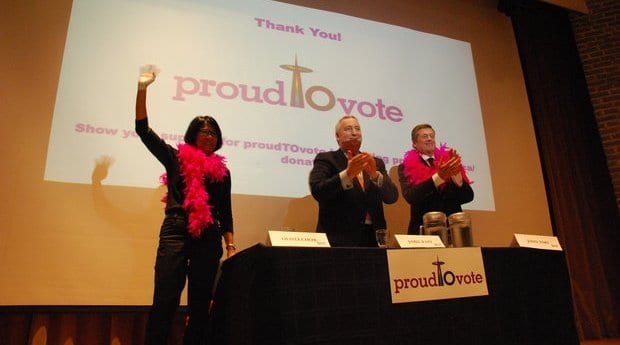John Tory isn’t budging from his stance that the phrase “Israeli apartheid” shouldn’t have a place at Pride, or any other city event.
The Toronto mayoral candidate, who has held a comfortable lead in the polls for several weeks, waded into the debate over whether Queers Against Israeli Apartheid (QuAIA) should march in the yearly Pride parade at a debate held at the Friends of Simon Wiesenthal Center for Holocaust Studies on Sept 19. He and fellow candidate Olivia Chow were both asked if they would vote to continue to fund Pride if QuAIA marched in the parade.
Tory told the audience that he would vote against funding Pride, and he held firm to his opinion later that night when the question was asked again at proudTOvote’s debate on LGBT issues. He explained that while he believes in free speech and understands that QuAIA’s actions have not been found to be in violation of the city’s human rights policy, he would be willing to change the policy so that the phrase “Israeli apartheid” could not be used at city-funded events.
As Tory himself pointed out, his opinion on this matter is not new. The Toronto Sun quoted him as saying that the use of the word apartheid in relation to Israel is fraudulent and offensive just before WorldPride, and Tory told reporters after the debate last night that he spoke out against QuAIA’s participation in the parade when he was a radio-show host at Newstalk 1010, a point reiterated by his campaign co-chair Bob Richardson on Twitter.
Tory says that for him, this is a matter of principle. “I think a lot of people who support Pride as I do, and understand its fundamental importance to the community and support public funding for it, would also support would I said,” he says.
“We probably have to have a better, more explicit policy than to say, If you are going to use words like that, which in my view are hateful and are abusive of a community that shares our city of Toronto with the LGBT community and everybody else, that we shouldn’t publicly fund those, or they can withdraw the use of those words,” he adds. “They have a choice.”
Tory told Xtra earlier this year that he has marched in approximately eight Toronto Pride parades since about 2002 or 2001. He also marched in this year’s WorldPride parade, where QuAIA marched with a small contingent with limited protest against them.
While Tory’s views might be old news, the fact that they are raised now, after QuAIA quietly marched in the WorldPride parade this past June, is surprising to both QuAIA and Pride Toronto.
“This is a dead issue,” says Tim McCaskell, a spokesperson for QuAIA. He pointed out that QuAIA has twice faced Pride Toronto’s internal dispute resolution panel, which ruled that they could march. As well, both the city manager and city solicitor have found separately that the phrase “Israeli apartheid” does not violate the city’s anti-discrimination policy or any other applicable laws.
“For him to once again attack freedom of speech at Pride and Pride’s independence, promising to use his position of mayor to open up this whole divisive issue and potentially defund one of the city’s largest summer festivals is probably the most foolish thing I could think of him to actually do as a mayoral candidate,” McCaskell added.
Sean Hillier, co-chair of Pride Toronto’s board of directors, says he is disappointed that this debate is being raised again. “It always put the festival in a great deal of limbo in the lead-up to it, so we were hoping that this was behind us,” he says.
In 2013, Pride Toronto received $139,960 of city grant funding, though that amount reportedly rose to about $160,000 this year. In 2013 the organization also received just over $1.3 million in sponsorships, which makes up a significant part of their yearly revenue.
Pride Toronto will always adhere to the city’s policies, Hillier says. But he thinks that it is important that the parade maintain its identity as a political demonstration.
“[Pride] is about celebrating who we are as an oppressed group throughout history, so I think we’ve been very firm that we stand on the side of freedom of speech,” he says.
Hillier wouldn’t comment on Tory’s claim that he would change the city’s human-rights policy to ban the term Israeli apartheid. However, if Tory were elected mayor and went through on his promise to change the city’s anti-discrimination policy, it could potentially affect several other city festivals.
In April 2013, Xtra reported that QuAIA had previously partnered with the Images Festival, which takes place at the Art Gallery of Ontario and the TIFF Bell Lightbox, two institutions that also receive city funding. Xtra also reported that the Toronto International Film Festival (TIFF) has shown films that use the phrase “Israeli apartheid.”
Tory’s rival Chow said at both debates that while she doesn’t agree with QuAIA’s message, she respects the decision of Toronto’s city council to continue to provide funding for Pride. “The Pride parade is about celebration, it’s about inclusion, it’s about celebrating who you are,” she said at scrum following the proudTOvote debate, adding that QuAIA is one small organization taking part in the parade. “I would hate to see . . . that the parade itself would lose its funding because of it.”
Aside from the QuAIA issue, the proudTOdebate on LGBT issues was a civil affair, with Chow and Tory finding common ground on several other issues and each getting support from the crowd. Doug Ford declined his invitation to attend the debate.
Chow did stumble when asked how she would promote trans inclusion. In answering the question, she told the audience how Susan Gapka, a local trans-community organizer, transitioned while working in Chow’s city hall office in the late 1990s. In telling the story, Chow revealed Gapka’s pre-transition name, generally considered a faux pas in the trans community unless the speaker has permission.
“My name was dropped a few times, I heard,” says Gapka, who found out she had become part of the debate on social media. Gapka was surprised that Chow even remembered her previous name after such a long time had passed.
“It was a little faux pas, but it goes to show you that there is a lot to learn about trans people,” Gapka says, adding that she believes Chow has a strong commitment to human rights and has no concerns about her commitment to inclusion. “When I came out in the office, I was so totally supported.”


 Why you can trust Xtra
Why you can trust Xtra


